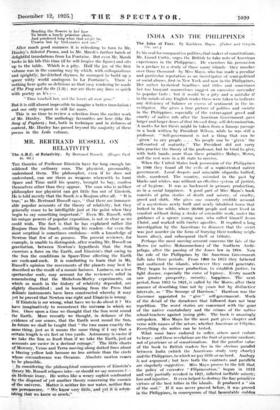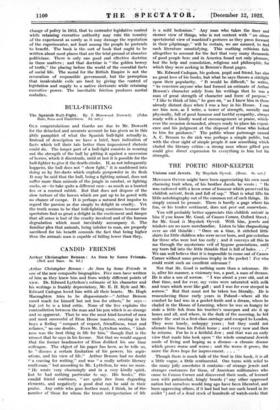INDIA AND THE • PHILIPPINES
IN his zeal for comparative polities, t hat maker of constitutions; Mr. Lionel Curtis, urges the British to take note of American experiences in the Philippines. He exercises his persuasion in a preface to a study of those many islands--they number over three thousand—by Miss Mayo, who has made a peculiar and particular reputation as an investigator of semi-political or social abuses, first in New York and now in the Philippines. Her rather hysterical headlines and titles and sometimes her too buoyant mannerisms suggest an excessive surrender to popular taste ; but it would be a pity and a mistake if in the minds of any English reader these were taken to indicate any deficiency of balance or excess of sentiment in the in- vestigator. She gives a true picture of polities and society in the Philippines. especially of the extravagant greed and cruelty of native rule after the American Government gave larger and larger doses of that blessed drug, self-determination. -*A motto for het thcrais Might be taken from a fanning passage in a book written by President Wilson, while he was still a professor: " Self-government is not a thing that can be given' to any people. . . . No people can be given' the self-confrol of maturity." The President did not carry into practice the theory of the professor, but he tried to give, with both hands, more than these primitive Malays, Moros, and the rest were in a fit state to receive.
' When the United States took possession of the Philippines in 1900 they found all the evils of a sophisticated native government. Local despots and miserable oligarchs bullied; stole, murdered. The country, misruled in the past by' blacks and whites, was without an effective system of justice; or of hygiene. It was as backward in primary production; as in a social happiness. A good part of Miss Mayo's book consists of grim stories of death and misery, of cruelty; greed and sloth. She gives one scarcely credible account of a mysterious newly built and newly inhabited town that lurked in the wilds, where 20,000 people and more lived in comfort without doing a stroke of ostensible work, under the guidance of a spruce young man, who called himself Jesus Christ, and worked with twelve apostles. It required a long investigation by the Americans to discover that the secret was just murder in the form of burying their working neigh- bours alive), and subsequent theft or tribute.
Perhaps the most moving account concerns the fate of the Moros (or native Mohammedans) of the Southern Archi- pelago, after the passing of the Jones law in 1916. Now the rule of the Philippines by the American Government falls into three periods. From 1900 to 1913 they fathered and mothered the islands, wherever they could penetrate. They began to increase production, to establish justice, to fight disease, especially the curse of leprosy. Every month Saw - greater prosperity, security, happiness. The' next period, from 1913 to 1921, is called by the Maros, after their manner of describing time not by years but by distinctive intervals, as " The Scourge of Harrison." Harrison was the Governor appointed to " give " self-government. Much of the detail of the decadence that followed does not bear repetition. The worst stories are- concerned with the guns/ of the native constabulary and the crimes of the native school-teachers against young girls. The book is amazingly outspoken. Miss Mayo for the most part gives chapter and verse with names of the actors; whether American or Filipino. Everything she writes can be tested.
What some haVe endured to suffer, others must endure to bear ; and these revelations are the fruit of genuine candour; not of Pturieneeor of sensationalism. But the peculiar value. of the book to British 'readers lies in the obvious parallel between India (which the Americans study very closely) and the -Philippines, to which we pay little or no heed. Analogy Is not argument ; but here both the contrasts and parallel* are singularly suggestive: Miss Mayo proves to the hilt that, the -policY of 'excessive " Filipinosation," hegun in 190 and only partially revoked in 1921, inflicted ineffable *misery; loss and injustice. It even helped to destroy the tine primitive virtues of the best tribes in the islands. It produced a " sin of• the soul." If it was never proved before, it .was proved in the Philippines, in consequence of that lamentable sudden change of policy in 1918, that to surrender legislative control while -retaining - executive authority may ruin the lountry of the experiment as surely as it may damage the reputation of the experimenter, not least among the people he pretends to benefit. The book is the sort of book that ought to be written about most places that are the trial ground of absentee politicians. There is only one good and effective doctrine in these -matters ; and that doctrine is " the golden heresy of truth," the placing before the world of the essential facts of social life. The moral for the British Empire is not the revocation of responsible government, but the perception . that incideulable evils are bred by giving the control of legislation and supply to a native electorate while retaining executive' power. The inevitable friction produces mortal maladies.























































 Previous page
Previous page